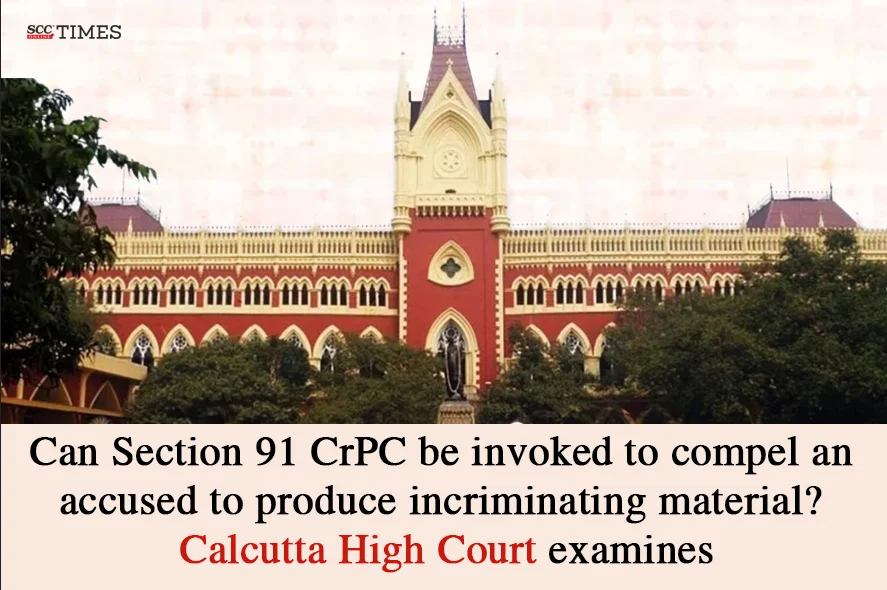Calcutta High Court: The instant matter dealt with two criminal revisional applications, filed under Section 528 of the Bharatiya Nagarik Suraksha Sanhita (BNSS) moved by the revisionist seeking quashing of two separate complaint proceedings pending before the Judicial Magistrate, First Class, Kalimpong, also challenging the orders dated 13-05-2025 of the Trial Court directing the accused to produce certain rent receipts, as well as the orders dated 23-07-2025 of the Sessions Judge, Kalimpong, which had affirmed the trial court’s directions. Partha Sarathi Sen, J., quashed all proceedings and sets aside the impugned orders in absence of any other cogent materials supporting the case of the complainant.
The factual matrix revealed that the revisionist had instituted suit before the Civil Judge, Senior Division, Kalimpong, claiming right, title and interest over a property. In that suit, he relied upon six rent receipts, allegedly executed by one who stands deceased. The complainant, who was the opposite party in the criminal proceedings and the son of the said deceased, alleged that those receipts were forged and fabricated. On this basis, a criminal case was filed under Section 200 of the Code of Criminal Procedure, 1973 (CrPC), alleging offences under Sections 193, 196, 199, 200, 465, 467, 471 read with Sections 191, 192, 463, and 464 of Penal Code, 1860 (IPC). After cognizance, process was issued, and the revisionist was enlarged on bail. Subsequently, the complainant also moved an application under Section 340 CrPC before the civil court, which led to the initiation of another criminal case before the same Magistrate, where again the accused appeared and was granted bail. Thus, two complaint cases, on essentially the same allegations, came to be pending against the accused.
During the proceedings, the complainant moved an application on 08-08-2024 before the Trial Court seeking a direction to the accused to produce the original rent receipts for forensic examination by CFSL, in comparison with admitted signatures of the deceased. By orders dated 13-05-2025, the Trial Court allowed this prayer and directed the accused to produce the documents. These orders were challenged before the Sessions Judge in criminal revisions, but the same were dismissed on 23-07-2025 on the ground that the impugned orders were interlocutory in nature.
Counsel for the revisionist argued that the Trial Court’s directions violated the fundamental guarantee under Article
Counsel for the complainant argued that the trial court’s orders merely sought production of documents necessary for adjudication, and that such production did not amount to compelling the accused to be a witness against himself. He relied on the Constitution Bench ruling in State of Bombay v. Kathi Kalu Oghad, 1961 SCC Online SC 74, to submit that the act of producing documents under a summons does not transform the accused into a witness, and that Article 20(3) is not violated merely by requiring production. He further submitted that the Sessions Judge had correctly declined interference on the ground of interlocutory nature of the orders.
The Court noted that the complainant was not in possession of any admitted specimen signatures of the deceased, and hence the direction to send the questioned documents for comparison could not be meaningfully complied with. More importantly, the Court emphasized that Article
The Court further held that the Sessions Judge erred in dismissing the revisions as barred under Section 397(2) CrPC by wrongly categorizing the impugned orders as interlocutory. Relying upon Amar Nath (supra), it clarified that an order substantially affecting the rights of an accused cannot be treated as interlocutory, as it directly impinges upon his constitutional protection. Moreover, the Court noted that since criminal case arose on the same allegations as another criminal case, the subsequent case was hit by the constitutional protection against double jeopardy under Article 20(2).
Thus, the Court concluded that the impugned orders dated 13-05-2025 of the Judicial Magistrate, Kalimpong, and the affirming orders dated 23-07-2025 of the Sessions Judge, Kalimpong, were legally unsustainable and deserved to be set aside. It further found that the complainant had no evidence other than the rent receipts questioned in possession of the accused, and in the absence of independent material, allowing the criminal cases to proceed would be wholly unjustified.
[Ram Kishan Mittal v State of West Bengal, 2025 SCC OnLine Cal 6945, decided on 21-08-2025]
Advocates who appeared in this case :
For the petitioner: Dr. Arjun Chowdhury, Adv., Mr. Masood Sultan, Adv., Ms. Pratusha Dutta Chowdhury, Adv., Ms. Sunayana Parveen, Adv., Ms. Riya Agarwal, Adv., Mr. Mantu Mandal, Adv., Mr. Bappaditya Roy, Adv.
For the State in CRR 396: Mr. Nilay Chakraborty, APP, Of 2025 Mr. Saikat Chatterjee, Adv.,
For the State in CRR 396: Mr. Aditi Shankar Chakraborty, APP, Of 2025 Mr. Sourav Ganguly, Adv.
For the O.P nos. 2, 3 &4: Mr. Ajay Singhal, Adv., Mrs. Heena Yasmin Shaikh, Adv., Ms. Chiroshhre De, Adv.





